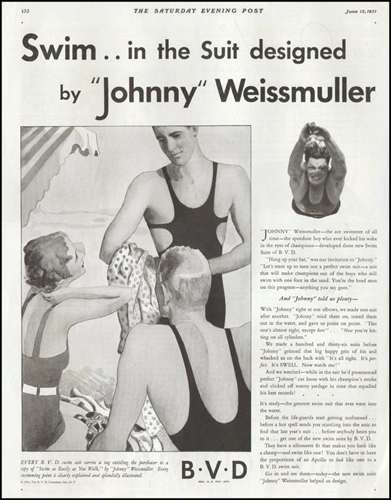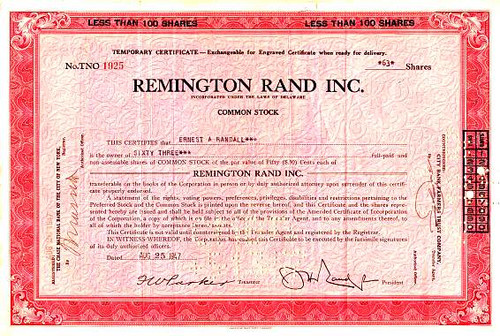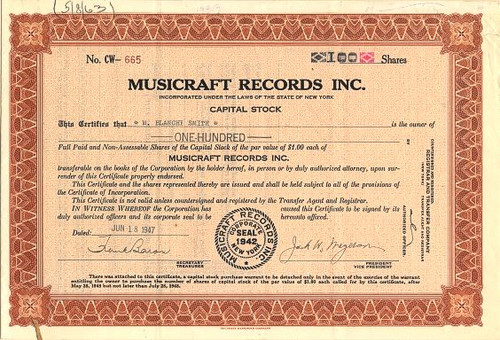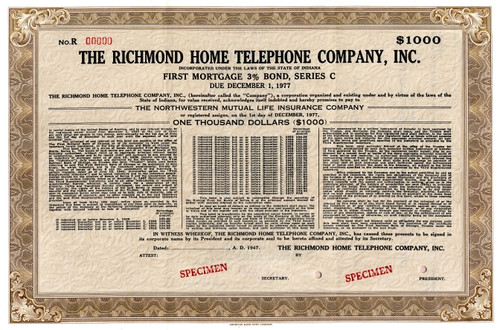Beautiful certificate from the Fruit of the Loom, Inc issued in 1947. This historic document was printed by Central Banknote Company and has an ornate border around it with a vignette of a display of fruit - the company logo. This item has the signatures of the Company's President, S. B. Smart and Secretary and is over 73 years old. 
Certificate Vignette Fruit of the Loom is a leading, international vertically integrated basic apparel company, emphasizing branded products for consumers ranging from children to senior citizens. The Company is one of the largest manufacturers and marketers of men's and boys' underwear, women's and girls' underwear, printable T-shirts and fleece for the activewear industry, casualwear, women's jeanswear and childrenswear. Fruit of the Loom employs approximately 31,000 people in over 60 locations worldwide. The Company sells its products principally under the FRUIT OF THE LOOM®, BVD®, SCREEN STARS®, BEST™, CUMBERLAND BAY™, WILSON® AND GITANO® brands. The Company also designs, manufactures and markets licensed apparel bearing the names, trade names, logos and insignia of the major professional sports leagues, their teams, certain popular players in the leagues and the logos of most major colleges and universities under the PRO PLAYER® and FANS GEAR® brands. The Company is a leading international, vertically integrated basic apparel company, emphasizing branded products for consumers ranging from infants to senior citizens. The Company is one of the largest producers of men's and boys' underwear, activewear for the screenprint T-shirt and fleece market, women's and girls' underwear, casualwear, women's jeanswear and childrenswear, selling products principally under the FRUIT OF THE LOOM®, BVD®, SCREEN STARS®, BESTTM, MUNSINGWEAR®, WILSON®, and GITANOTM brand names. In addition to undecorated products, the Company offers underwear, sportswear and T-shirts decorated with licensed characters, including STAR WARSTM, BATMANTM, SUPERMANTM, SPIDERMANTM, LOONEY TUNESTM, SESAME STREETTM, SCOOBY-DOOTM, WOODY WOODPECKERTM, CURIOUS GEORGETM and TELETUBBIESTM. The Company is a fully integrated manufacturer, performing most of its own yarn spinning, knitting, cloth finishing, cutting, sewing and packaging. Management considers the Company's primary strengths to be its excellent brand recognition, low cost production resulting primarily from the offshore location of substantially all of its labor-intensive manufacturing operations, and strong relationships with major discount chains and mass merchandisers. Management believes that consumer awareness of the value, quality and competitive prices of the Company's products will benefit the Company in any retail environment where consumers are value conscious. Organization and Products The Company has organized its business into four areas: (1) retail products (50% of 1998 net sales); (2) activewear (28%); (3) licensed sportswear (9%); and (4) European business (13%). The products included in the retail business are generally sold to major discount chains and mass merchandisers and consist of (i) men's and boys' underwear; (ii) women's and girls' underwear; (iii) domestic casualwear (i.e., undecorated or ''blank'') T-shirts and fleecewear; (iv) international casualwear T-shirts, 70% of which are sold in Canada, 16% in Mexico and 14% in Japan; (v) women's and girls' jeanswear; and (vi) childrenswear. The products included in the activewear business are sold to large wholesale distributors, who break down bulk purchases for resale to the screenprint market and speciality retailers, and consist primarily of T-shirts and fleecewear. The products included in the licensed sportswear business are distributed in the mass merchant channel and to sports specialty and department stores. European apparel product offerings generally consist of T-shirts, fleecewear and polo shirts sold to wholesale distributors for resale to the imprint market (63%) and sold to the retail market (37%). These products are sold primarily in Western European countries. Within its four business areas, the Company produces a wide range of basic apparel products and believes that price, product quality and responsive delivery are the most important factors in the sale of these products. The Company's products are divided into seven product categories: (1) men's and boys' underwear, (2) activewear, (3) women's and girls' underwear, (4) casualwear, (5) women's jeanswear, (6) licensed sportswear, and (7) childrenswear. The following is a brief description of each of the Company's product categories: Men's and Boys' Underwear. The Company offers a broad array of men's and boys' underwear including briefs, boxer shorts, T-shirts and A-shirts, and colored and ''fashion'' underwear. These products are primarily sold to major discount chains and mass merchandisers. The Company sells all-cotton and cotton-blend underwear under its FRUIT OF THE LOOM and BVD brand names. Products sold under the BVD brand name are generally designed to appeal to a more premium market and are priced higher than those sold under the FRUIT OF THE LOOM brand name. Under its licensing arrangements, the Company manufactures and markets men's and boys' underwear bearing the MUNSINGWEAR and KANGAROO® trademarks in the United States and certain overseas markets. The Company is one of the market leaders in men's and boys' underwear, with a 1999 domestic market share of approximately 32%. A recent survey found that the FRUIT OF THE LOOM brand was the most recognized of 90 men's apparel brands, with 95% brand awareness. Activewear.The Company produces and sells undecorated T-shirts, fleecewear, and knit sport shirts to the Imprinted sportswear Market. These products are manufactured in a variety of styles and colors and are sold to wholesalers, garment decorators and ad specialty retailers. Sub brands include: SupercottonTM, Lofteez®, ringspunteeTM, Heavy Cotton, BestTM, Premium Tee and Premium Cotton. Research reveals we are the leading domestic Activewear manufacturer, with 30% market share within the wholesaler/screenprint segment of the 1998 Decorated T-Shirt Market (most recent data available). Women's and Girls' Underwear. The Company offers a variety of women's and girls' underwear under the FRUIT OF THE LOOM brand name, including cotton, nylon and lycra panties. These products are primarily sold to major discount chains and mass merchandisers. In addition, the Company has granted a license to Warnaco Inc. for the manufacture and sale of bras, slips, camisoles and other products under the FRUIT OF THE LOOM brand name in North America. The Company also licenses the use of the FRUIT OF THE LOOM brand name to a manufacturer of sheer hosiery. The Company is one of the branded market leaders in the fragmented women's and girls' underwear market, with a 1999 domestic market share of approximately 15%. Casualwear.The Company markets undecorated T-shirts and fleece tops, shorts and bottoms to mass merchandisers as casualwear under the FRUIT OF THE LOOM, BVD and MUNSINGWEAR brands. Casualwear is produced in separate Spring and Fall lines, with updated color selections for each of the men's, women's, boys' and girls' categories. Licensed Sportswear. The Company designs, manufactures and markets sports apparel under licenses granted by major professional sports leagues, professional players and many colleges and universities in the United States. The Company also has licenses with The Walt Disney Company for its ESPN and X-Games properties. The Company sells a wide variety of quality sportswear, including T-shirts, sweatshirts, shorts and outerwear under the WILSON trade-mark. The Company manufactures and markets a wide variety of decorated sportswear to retail stores and mass merchants. Childrenswear.The Company offers a broad array of childrenswear, including decorated underwear (generally with pictures of licensed movie or cartoon characters) under the FUNPALS®, FUNGALS® and UNDEROOS® brand names. Business Strategy Low Cost Manufacturing. The Company's strategy is to use its automated textile manufacturing facilities in the United States for yarn spinning, knitting, bleaching and dyeing, together with low cost offshore operations for labor-intensive cutting, sewing and finishing activities. This combination allows the Company to optimize its cost structure and offer continued value to its customers. As part of this strategy, over the last three years the Company transferred substantially all of its sewing operations to locations in Mexico, the Caribbean and Central America. In 1998, over 95% of the Company's garments were sewn offshore, as compared to approximately 12% at the beginning of 1995. The Company estimates that, as a result of the movement of its sewing operations offshore, assembly costs have been reduced by more than $150 million annually. Based on the Company's selling price points and operating margins on its various products, management believes that the Company is one of the lowest cost producers in the markets it serves. Utilizing Contract Manufacturers. Approximately half of the garments sewn offshore in 1998 were assembled by contract manufacturers, with the remaining half, consisting primarily of large volume styles, assembled at Company-owned and operated facilities. While management believes it has the greatest cost reduction potential at its Company-owned facilities, the Company uses contract manufacturers for the following reasons: (i) to balance internal capacity requirements, (ii) to manufacture low volume specialty garments, (iii) to accommodate seasonal or one-time programs, and (iv) to bridge capacity in the move from domestic plant to offshore plant sewing. The Company has increased its own sewing capacity in Mexico and Central America, and expects to continue to reduce its reliance on contract manufacturing, resulting in further cost reductions. Developing Product Line Extensions and New Products. The Company continues to expand its existing product lines with variations designed to enhance product demand and increase revenues. Specifically, the Company has responded to the popularity of boxers in the men's and boys' underwear product category by expanding its offerings of boxers and boxer briefs in various patterns and silhouettes. In the women's and girls' underwear category, the Company is introducing new products through its FTL Sport and Close Comfort programs, which feature styles for improved fit and more comfortable feeling fashions. In the childrenswear category, the Company is introducing an updated line of its UNDEROOS brand costume underwear sets in a variety of popular character prints, including new licensing properties such as STAR WARS, SUPERMAN, SPIDERMAN and TELETUBBIES. In addition, the Company is introducing new product variations in its activewear and licensed sportswear categories, including the Company's authentic program with the National Hockey League for team jerseys and uniforms. Expanding Marketing Programs. The Company's marketing programs emphasize the quality and consistency of the brands it owns and those it licenses from others. Management is increasing its emphasis on marketing programs, with an enhanced commitment to advertising and promotional programs. In 1996, the Company signed a ten-year agreement to rename Joe Robbie Stadium (home of the Miami Dolphins and Florida Marlins, as well as the 1999 Super Bowl) as Pro Player Stadium. In addition, the Company has launched a new advertising campaign focusing on Fruit of the Loom, BVD and Pro Player products. Enhancing Information Systems. The Company has committed additional resources to enhance its information systems (''IS''). This effort has included the development of a new order entry system enabling activewear retailers to order from wholesalers through the Internet and the implementation of Electronic Data Interchange (''EDI'') with its major retail customers. In addition, the Company has implemented its Vendor Managed Inventory (''VMI'') program, enabling the Company to partner with its customers and allowing these customers to maintain optimal inventory levels. The VMI program and other IS enhancements enable the Company to improve utilization of its own inventories by matching production more closely with customer point of sale information. The Company plans to continue its efforts in the IS area in 1999 and future years to improve its efficiency and customer service. Marketing and Distribution The Company sells its products to over 10,000 accounts, including all major discount chains and mass merchandisers, wholesale clubs and screenprinters. The Company also sells to many department, specialty, drug and variety stores, national chains, supermarkets and sports specialty stores. In 1999 approximately 91% of the company's domestic products, sold through retail channels, were sold through major discount chains and mass merchandisers. The remaining 9% were sold through a mix of deaprtments stores, chains, specialty stores, and other outlets. Management believes that if the Company were to lose any one customer, a large percentage of these sales would shift to other outlets due to the high degree of brand awareness and consumer loyalty to the Company's products. The Company's products are principally sold by a nationally organized direct sales force of full-time employees, while certain of the Company's products are sold through independent sales representatives. The Company's products are shipped from five primary distribution centers. Management believes that among the Company's primary strengths are its long-standing excellent relationships with major discount chains and mass merchandisers. These retailers accounted for approximately 66% of the men's and boys' underwear and approximately 62% of the women's and girls' underwear sold in the United States in 1999. During the last several years, many of the Company's principal customers have revamped their inventory and distribution systems, requiring their suppliers to offer more flexible product deliveries. In response to these demands and to enable the Company to better monitor and control its own inventory levels, the Company has made substantial investments in IS and in upgrading its warehousing and distribution capabilities.
BVD, founded in 1876 by three gentlemen: Messrs. Bradley, Voorhees and Day, is one of the most famous and historically innovative brands in America. Manufacturing both men's and women's underwear, the company became popular for its men's BVD Spiral Bustle, an underwear line made of heavy knitted cotton or cotton/wool fabric, long sleeves and long legs. In short, the garment was bulky, tight fitting and not very comfortable. In 1908, BVD transformed its original spiral bustle into a revolutionary new type of athletic underwear that was loose fitting and much more comfortable. From there BVD went on to introduce a two-piece underwear model, as well as the popular union suit. BVD also introduced a lightweight waffle-like fabric that combined with the catchy slogan "Next to Myself I Like BVD Best" created what was and remains the best known initial trademark in the world. To stimulate sales during the depression, BVD began production of what was at that time provocative men's and women's swimwear. BVD helped start the fad of "Topless" swimming trunks for men and featured Olympic swimmer Johnny Weismuller (the original Tarzan) in a BVD bathing suit. For the ladies, BVD started a trend toward skirtless, one-piece bathing suits for women. 
In 1951, BVD merged with Superior Mills. Together they revolutionized the industry by introducing radically new merchandising techniques. BVD was the first to package underwear in polybags (industry term for plastic bags) for the mass market, developed attractive store fixtures, and led the way in consumer promotions. During this same time period, BVD also became a vertically integrated company, controlling operations from the point of raw cotton all the way to finished goods. Extremely advanced for the 50's and still very rare today. Throughout the 60's and 70's BVD continued to evolve into an American icon and a popular national brand. BVD had the foresight to introduce fashionable underwear utilizing the one time popular nylon tricot and mesh underwear, stretch nylon underwear and 'sportops', the most popular pocket tee asked for by name to name a few. In 1976, Fruit of the Loom, Inc. purchased BVD, bringing worldwide opportunities to the brand. With Fruit of the Loom's strong heritage of men's underwear apparel, BVD focused its efforts solely toward men. History from press information. The Company extensively markets its activewear and, to a lesser extent, other products outside the United States, principally in Europe, Canada, Japan and Mexico. In order to serve these markets, the Company has manufacturing plants in Canada, the Republic of Ireland and Northern Ireland (United Kingdom), as well as manufacturing operations in Morocco where cut fabrics from the Republic of Ireland are sewn and returned to Europe for sale.

Certificate Vignette
BVD, founded in 1876 by three gentlemen: Messrs. Bradley, Voorhees and Day, is one of the most famous and historically innovative brands in America. Manufacturing both men's and women's underwear, the company became popular for its men's BVD Spiral Bustle, an underwear line made of heavy knitted cotton or cotton/wool fabric, long sleeves and long legs. In short, the garment was bulky, tight fitting and not very comfortable. In 1908, BVD transformed its original spiral bustle into a revolutionary new type of athletic underwear that was loose fitting and much more comfortable. From there BVD went on to introduce a two-piece underwear model, as well as the popular union suit. BVD also introduced a lightweight waffle-like fabric that combined with the catchy slogan "Next to Myself I Like BVD Best" created what was and remains the best known initial trademark in the world. To stimulate sales during the depression, BVD began production of what was at that time provocative men's and women's swimwear. BVD helped start the fad of "Topless" swimming trunks for men and featured Olympic swimmer Johnny Weismuller (the original Tarzan) in a BVD bathing suit. For the ladies, BVD started a trend toward skirtless, one-piece bathing suits for women.









